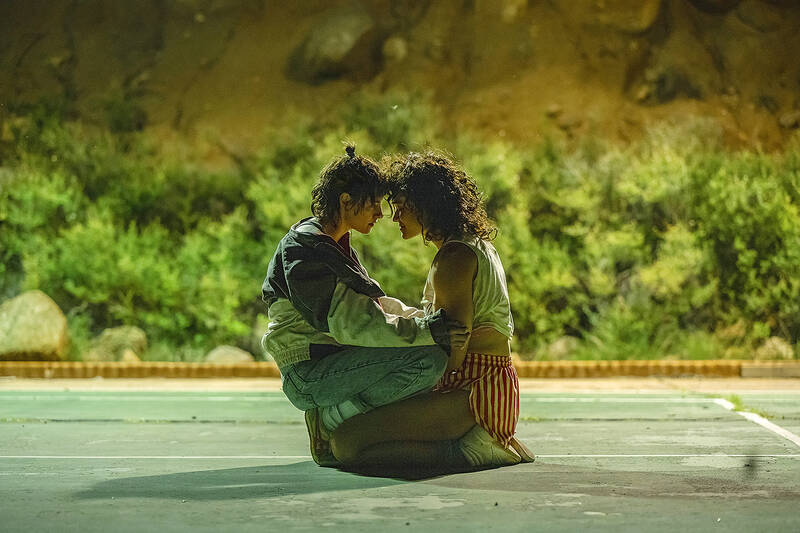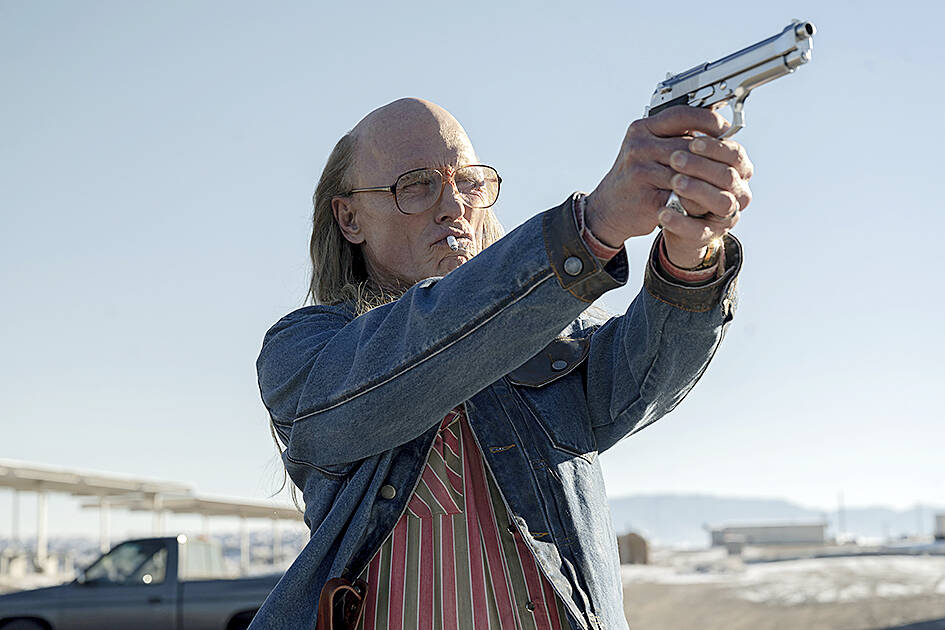Muscles ripple, veins pop and electronic music throbs in Love Lies Bleeding, a heaving, hyper-sexy neo-noir drenched in sweat, blood and bug guts.
If that last one seems a touch less expected, that moment, courtesy of a beetle-chomping Ed Harris, is far from the only off-the-wall provocation in Rose Glass’s film, a pulpy, fable-like lesbian crime thriller where bodies, large and small, get ravaged beneath starry desert skies.
Not all of it works. Heavy doses of melodrama and flashy surrealism sap some of the lurid spell of Love Lies Bleeding. But this feels tantalizingly close to the idealized version of a Kristen Stewart film. Stewart has been one of the most electric stars for years. But Love Lies Bleeding, in which she plays a cynical gym worker named Lou who falls in love with a body-building drifter, Jackie (Katy O’Brian), gives Stewart a vivid noir sandbox where all of her talent for obsession, desire and rage finds its gnarliest expression yet.

Photo: AP
Glass, the British filmmaker whose 2019 horror film Saint Maud marked an exciting debut, opens Love Lies Bleeding on a slightly magical note, gazing at the stars. The camera pans slowly down to a New Mexico warehouse where music thumps and people are flocking to. What sinister nocturnal den could this be? It’s momentarily disappointing to learn that it’s merely a gym, full of men and women pushing themselves to exhaustion with machines and dumbbells. Signs around them blare slogans like “Only Losers Quit.”
The urge to make yourself bigger — with weights, drugs, guns, power or, maybe, love — reverberates through Love Lies Bleeding. More than once, Glass will linger on muscles swelling, almost Hulk-like, though those expansions have nothing on the immensity Lou and Jackie ultimately find together.
Poisons are also lurking everywhere. To the exercisers, weakness is one. Lou is a smoker but trying to quit. Jackie is hooked on a body-builder fantasy and self-actualization mania. And then there’s the malignancy of the local shooting range, where Lou Sr (Harris) presides over a corrupt gun-dealing empire behind a desk surrounded by creepy crawlies. The satire of Love Lies Bleeding isn’t timid. A billboard reads: “Dreams, Next Exit.”

Photo: AP
The shooting range is where Jackie lands a job, after a transactional encounter with a sleazy, mulleted flunky named JJ (Dave Franco) in his car.
“That was magical,” he says after something that was very clearly not. The real magic will come later in Love Lies Bleeding, but not for JJ, whose abusiveness to his wife and Lou’s sister Beth (Jena Malone) leads to a bloody series of events that reluctantly bring Lou into increasingly closer orbit with the estranged father she resents, Lou Sr.
All of this proceeds, in a way, out of the love that blooms between Lou and Jackie. It begins with an injection of steroids and a kiss, and quickly turns passionate and protective. Their increasingly tight bond drives them to violent extremes. To be in love is to be ruthless — with former lovers (Anna Baryshnikov plays a jilted love interest of Lou’s) and family, alike.

Photo: AP
Jackie’s roid-addled disturbia is a factor, too, making Love Lies Bleeding an interesting corollary to the unreleased Jonathan Majors bodybuilder film Magazine Dreams, not to mention The Iron Claw, another beefy A24 film about family rot and muscle-building.
Like that film, Love Lies Bleeding is set in the 1980s, though it feels more out of time. As things spiral in the script by Glass and Weronika Tofilska, the movie keeps an expansive eye toward the grisly happenings, at times adopting the perspective of Jackie’s drugged delirium, like when she escapes to Las Vegas to participate in a body-building contest, or sliding closer to Lou Sr, as he coolly pulls strings.
But it’s getting dangerous to cut away from Stewart. Love Lies Bleeding loses a little momentum every time she’s not on screen. No one would come out of Love Lies Bleeding wishing for less of Harris, though. He seems to be getting only better with age, his voice more resonate. As clownish as he’s made up in the film — bald on top, long hair to his shoulders — he resolutely grounds a movie that resorts to some unnecessary outrageous flourishes. (I fear this is an increasingly common effect of today’s battered movie world — an urge to overcompensate with buzz-hopeful quirk.)
But neo-noirs made with this degree of style deserve some latitude to go for broke. As the sign says, “Only losers quit.”

May 18 to May 24 Pastor Yang Hsu’s (楊煦) congregation was shocked upon seeing the land he chose to build his orphanage. It was surrounded by mountains on three sides, and the only way to access it was to cross a river by foot. The soil was poor due to runoff, and large rocks strewn across the plot prevented much from growing. In addition, there was no running water or electricity. But it was all Yang could afford. He and his Indigenous Atayal wife Lin Feng-ying (林鳳英) had already been caring for 24 orphans in their home, and they were in

President William Lai (賴清德) yesterday delivered an address marking the first anniversary of his presidency. In the speech, Lai affirmed Taiwan’s global role in technology, trade and security. He announced economic and national security initiatives, and emphasized democratic values and cross-party cooperation. The following is the full text of his speech: Yesterday, outside of Beida Elementary School in New Taipei City’s Sanxia District (三峽), there was a major traffic accident that, sadly, claimed several lives and resulted in multiple injuries. The Executive Yuan immediately formed a task force, and last night I personally visited the victims in hospital. Central government agencies and the

Australia’s ABC last week published a piece on the recall campaign. The article emphasized the divisions in Taiwanese society and blamed the recall for worsening them. It quotes a supporter of the Taiwan People’s Party (TPP) as saying “I’m 43 years old, born and raised here, and I’ve never seen the country this divided in my entire life.” Apparently, as an adult, she slept through the post-election violence in 2000 and 2004 by the Chinese Nationalist Party (KMT), the veiled coup threats by the military when Chen Shui-bian (陳水扁) became president, the 2006 Red Shirt protests against him ginned up by

As with most of northern Thailand’s Chinese Nationalist Party (KMT) settlements, the village of Arunothai was only given a Thai name once the Thai government began in the 1970s to assert control over the border region and initiate a decades-long process of political integration. The village’s original name, bestowed by its Yunnanese founders when they first settled the valley in the late 1960s, was a Chinese name, Dagudi (大谷地), which literally translates as “a place for threshing rice.” At that time, these village founders did not know how permanent their settlement would be. Most of Arunothai’s first generation were soldiers